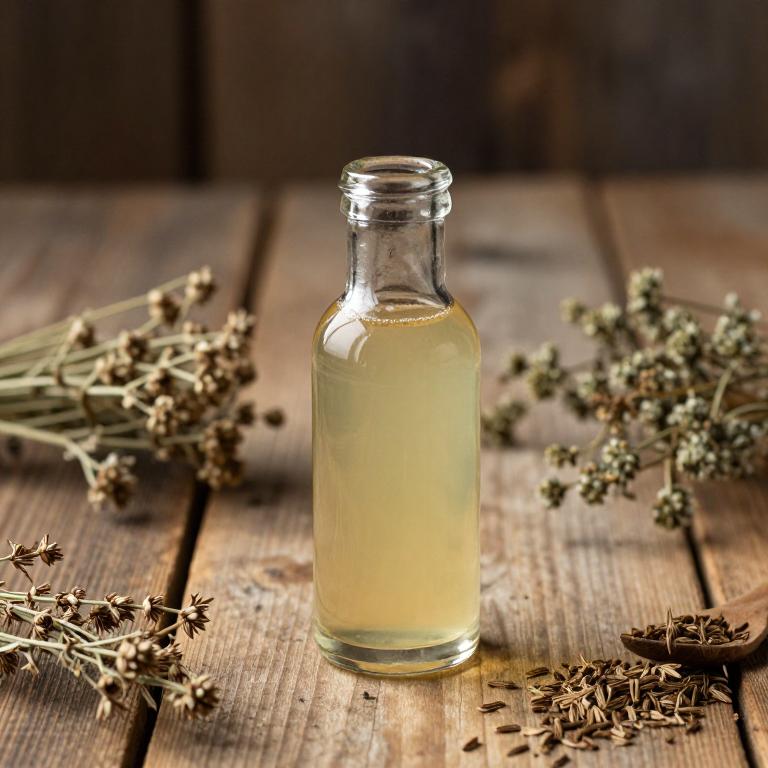10 Best Herbal Juices For Acid Reflux

Herbal juices can be a natural and effective way to manage acid reflux by soothing the digestive system and reducing stomach acidity.
Juices made from ginger, licorice root, and aloe vera are commonly recommended for their anti-inflammatory and antacid properties. These herbal extracts help neutralize stomach acid and protect the esophageal lining from irritation. Incorporating these juices into a daily routine may provide relief from symptoms without the side effects of over-the-counter medications.
However, it's important to consult with a healthcare professional before starting any new herbal regimen to ensure safety and suitability for individual health conditions.
Table of Contents
- 1. Thistle (Silybum marianum)
- 2. Fennel (Foeniculum vulgare)
- 3. Ginger (Zingiber officinale)
- 4. Cumin (Cuminum cyminum)
- 5. Licorice (Glycyrrhiza glabra)
- 6. Peppermint (Mentha piperita)
- 7. Turmeric (Curcuma longa)
- 8. Common grape (Vitis vinifera)
- 9. Stinging nettle (Urtica dioica)
- 10. Chamomile (Matricaria chamomilla)
1. Thistle (Silybum marianum)

Silybum marianum, also known as milk thistle, is a herbal plant that has been traditionally used for its potential health benefits, including supporting liver function.
While it is not a direct treatment for acid reflux, some studies suggest that its anti-inflammatory and antioxidant properties may help reduce inflammation in the digestive tract, potentially offering relief for individuals with mild acid reflux symptoms. However, it is important to note that silybum marianum may interact with certain medications and should be used under the guidance of a healthcare professional. Herbal juices made from milk thistle are often consumed as a complementary therapy, but they should not replace conventional treatments for acid reflux.
Always consult a doctor before incorporating any herbal supplements into your regimen, especially if you have pre-existing medical conditions or are taking other medications.
2. Fennel (Foeniculum vulgare)

Foeniculum vulgare, commonly known as fennel, has been traditionally used in herbal remedies for its potential benefits in alleviating symptoms of acid reflux.
The essential oils found in fennel, particularly anethole, are believed to have antispasmodic and anti-inflammatory properties that may help reduce the discomfort associated with heartburn and indigestion. When consumed as a herbal juice, fennel can soothe the digestive tract and promote healthy digestion, potentially reducing the frequency of acid reflux episodes. However, it is important to consult a healthcare professional before using fennel juice, especially for individuals with existing medical conditions or those taking medications.
Overall, fennel juice may serve as a natural complement to conventional treatments for acid reflux, though its effectiveness can vary among individuals.
3. Ginger (Zingiber officinale)

Zingiber officinale, commonly known as ginger, has been traditionally used for its digestive benefits and is often incorporated into herbal juices to support digestion and alleviate symptoms of acid reflux.
The active compounds in ginger, such as gingerol and shogaol, possess anti-inflammatory and antioxidant properties that may help reduce gastric irritation and neutralize excess stomach acid. When consumed as a herbal juice, ginger can soothe the lining of the esophagus and promote the movement of food through the digestive tract, potentially preventing acid buildup. However, it is important to note that while ginger is generally safe, excessive consumption may worsen acid reflux in some individuals, so moderation is key.
Incorporating fresh ginger juice into a balanced diet, alongside other reflux-friendly foods, may offer natural relief for those experiencing occasional heartburn or indigestion.
4. Cumin (Cuminum cyminum)

Cuminum cyminum, commonly known as cumin, has been traditionally used in herbal remedies for its potential digestive benefits.
When incorporated into herbal juices, cumin may help alleviate symptoms of acid reflux by promoting healthy digestion and reducing stomach acidity. The essential oils in cumin, such as limonene and terpinene, are believed to have anti-inflammatory and carminative properties that support gastrointestinal health. However, while some individuals may find relief from cumin-based juices, it is important to consult a healthcare professional before using it as a treatment for acid reflux, especially if other symptoms or conditions are present.
Overall, cumin can be a beneficial addition to a balanced diet, but it should be used cautiously and in conjunction with other proven strategies for managing acid reflux.
5. Licorice (Glycyrrhiza glabra)

Glycyrrhiza glabra, commonly known as licorice root, has been traditionally used in herbal medicine for its soothing properties, and its juice is often recommended for individuals suffering from acid reflux.
The active compounds in licorice root, such as glycyrrhizin, may help reduce inflammation in the esophagus and strengthen the lower esophageal sphincter, which can prevent acid from flowing back into the throat. However, excessive consumption of licorice root juice can lead to side effects like increased blood pressure and fluid retention due to its mineralocorticoid-like effects. While some studies suggest potential benefits, more research is needed to confirm its efficacy and safety for long-term use in managing acid reflux.
It is advisable to consult a healthcare professional before incorporating licorice root juice into a treatment regimen for acid reflux.
6. Peppermint (Mentha piperita)

Mentha piperita, commonly known as peppermint, is often used in herbal juices for its soothing properties that may help alleviate symptoms of acid reflux.
The essential oils in peppermint have a calming effect on the gastrointestinal tract, potentially reducing the sensation of heartburn and bloating. When consumed as a juice, peppermint can help relax the lower esophageal sphincter, preventing stomach acid from flowing back into the esophagus. However, it is important to note that some individuals may experience worsened symptoms due to its potential to increase stomach acid production.
As with any herbal remedy, it is advisable to consult a healthcare professional before incorporating peppermint juice into a treatment plan for acid reflux.
7. Turmeric (Curcuma longa)

Curcuma longa, commonly known as turmeric, is a popular herbal plant often used in traditional medicine for its anti-inflammatory and antioxidant properties.
While turmeric is well-known for its potential health benefits, its use in the form of herbal juices for acid reflux is a topic of growing interest. Some studies suggest that curcumin, the active compound in turmeric, may help reduce inflammation in the digestive tract and potentially alleviate symptoms of acid reflux. However, it is important to note that turmeric can also stimulate the production of stomach acid in some individuals, which may worsen acid reflux in certain cases.
As a result, it is recommended to consult a healthcare professional before incorporating turmeric juice into a regimen for managing acid reflux.
8. Common grape (Vitis vinifera)

Vitis vinifera, commonly known as the grape vine, has been traditionally used in herbal medicine for its potential health benefits, including its role in managing acid reflux.
The berries of Vitis vinifera contain antioxidants, flavonoids, and other bioactive compounds that may help reduce inflammation and support digestive health. Some studies suggest that grape-derived juices could help neutralize stomach acid and soothe the esophageal lining, offering relief from heartburn and indigestion. However, it is important to note that while these juices may complement conventional treatments, they should not replace medical advice or prescribed medications for acid reflux.
As with any herbal remedy, it is advisable to consult a healthcare professional before incorporating Vitis vinifera juices into your diet, especially if you have pre-existing health conditions or are taking other medications.
9. Stinging nettle (Urtica dioica)

Urtica dioica, commonly known as stinging nettle, has been traditionally used for its medicinal properties, including potential benefits for digestive health.
Some herbal preparations made from Urtica dioica, such as juices or teas, are believed to help alleviate symptoms of acid reflux due to their anti-inflammatory and soothing effects on the gastrointestinal tract. These juices may support digestion by reducing excess stomach acid and promoting a balanced gut environment. However, it is important to note that while some individuals may find relief from using stinging nettle juice, scientific evidence supporting its efficacy for acid reflux is limited.
As with any herbal remedy, it is advisable to consult a healthcare professional before incorporating Urtica dioica into a treatment regimen for acid reflux.
10. Chamomile (Matricaria chamomilla)

Matricaria chamomilla, commonly known as chamomile, is a popular herbal remedy often used to alleviate symptoms of acid reflux due to its anti-inflammatory and soothing properties.
Chamomile juice, derived from the dried flowers of the plant, contains compounds like apigenin and bisabolol that may help reduce stomach acid and calm the gastrointestinal tract. Some studies suggest that chamomile may improve digestion and reduce the frequency of heartburn by relaxing the lower esophageal sphincter. However, while it is generally considered safe for short-term use, it should not replace medical treatment for severe acid reflux.
It is advisable to consult a healthcare professional before incorporating chamomile juice into a regular regimen, especially for individuals taking medications or with existing health conditions.